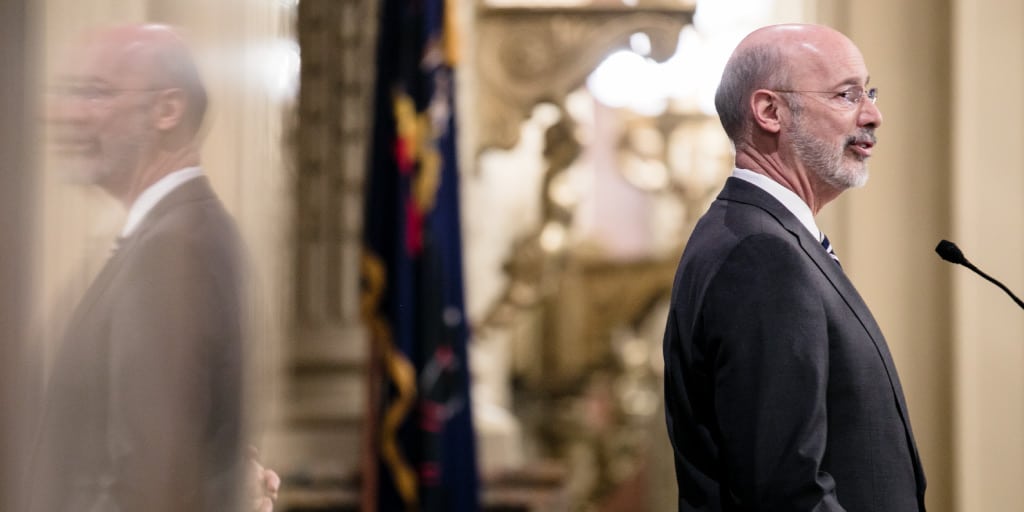
While Pennsylvania Gov. Tom Wolf on Tuesday outlined what he called a bold and sensible plan to move the Commonwealth forward in his new 2019-20 budget address, business stakeholders this week said they have a few problems with it.
“While we appreciate and respect the tone Governor Wolf deployed in his address — that we need to respect one another, listen to one another, and seek the common ground — the underlying differences remain,” David N. Taylor, president and CEO of the Pennsylvania Manufacturers’ Association (PMA), told Pennsylvania Business Report today.
Among the differences that business representatives pointed to regarding the governor’s plan, workforce development appears to be one of the most contentious.
“Governor Wolf is correct to focus on the workforce as a critical issue facing the Commonwealth, but before we commit to new programs and/or new spending we need to reform our existing workforce development/job training system, which is highly fragmented,” Taylor said.
Gordon Denlinger, state director of the National Federation of Independent Business (NFIB) in Pennsylvania, agreed and called it “ironic” that Wolf wants to help businesses find qualified workers, “but at the same time he is supporting a $15 minimum wage and pushing for a rule to expand overtime.”
“Small businesses need more workers today to fill immediate vacancies,” Denlinger said on Tuesday. “There wasn’t much detail on how he might help solve this problem quickly.”
Gene Barr, president and CEO of the Pennsylvania Chamber of Business and Industry, commended Wolf for using his budget address to spotlight the need for the private sector and state government to cooperate on workforce development.
“We are, however, concerned with some components of the governor’s proposal, including an aggressive mandated increase to entry-level wages to eventually $15 an hour across the Commonwealth,” Barr said in a Feb. 5 statement.
One major component of the governor’s plan is the Keystone Economic Development and Workforce Command Center, which Wolf said is aimed at tackling the skills gap and creating a well-trained workforce. The center will bring together agency heads and public and private sector experts to find solutions for connecting skilled workers with good jobs that employers need filled now and down the road, according to Wolf, who has asked Barr and union leaders to join the center, among others.
While pleased to be a co-chairman of the center, Barr nonetheless pointed out that myriad independent studies have shown that similar policies lead to negative impacts on employment, including job loss.
He cited a Congressional Budget Office report that determined that raising the minimum wage to $10.10 an hour would result in the loss of 500,000 to 1 million jobs nationwide.
“Going to $15 per hour will only exacerbate these impacts and those most likely to be harmed are the very low-income, lesser-skilled workers whom advocates claim they want to help,” said Barr.
NFIB’s Denlinger proposed that before Gov. Wolf spends another $10 million on workforce development, “current programs that are redundant or unsuccessful should be eliminated.”
At the same time, PMA’s Taylor pointed out that because the state’s system spends federal taxpayer dollars, it’s governed by federal rules that require dozens of different programs that are administered by multiple state agencies.
“If the governor would request a federal waiver from D.C. — as Indiana has already done — we could reorganize the more than $1.6 billion already being spent to create a system that better meets the current needs of Pennsylvania’s employers and employees,” said Taylor.
PMA today tweeted out a video responding — “with respect and concern” — to Wolf’s budget address. In it, Taylor noted that, “Election-year promises continue to obscure real-world specifics” when Gov. Wolf presented his budget to the General Assembly this week.
While acknowledging that Gov. Wolf struck a moderate tone in his address, Taylor said the plan still included many of the governor’s rejected proposals from his first term in office.
“When you read the fine print, the governor’s spending plan threatens to put Pennsylvania further behind in the competition between the states for investment, prosperity and jobs,” Taylor says in the video.
In an email, Taylor wrote that his association’s members actually regret that the governor has returned to several of his former proposals.
“New taxes on Pennsylvania energy production, punitive changes in tax compliance, and a hike in the state-mandated minimum wage would all be detrimental to growth, investment and jobs,” Taylor said.
Speaking of energy in the state, Barr added that Pennsylvania chamber members are disappointed by the Wolf administration’s continued call for an additional tax on the state’s natural gas industry.
“Access to affordable energy is one of the Commonwealth’s strongest competitive advantages,” said Barr. “And yet, despite the fact that the impact tax — which distributes money among all 67 Pennsylvania counties — is on track to bring in record high collections for 2018, this industry is once again being targeted for additional taxation.”
He agreed with Taylor and said that the state is at risk of losing its competitive edge in the critical energy arena if state-elected lawmakers keep looking at higher energy taxes as an option to generate more revenue for government spending.
Barr also said that chamber members want lawmakers and the governor to develop modern, smart policies that will help struggling Pennsylvanians rather than hurt employers and risk jobs.
Denlinger, while pleased Wolf promised no new taxes, said, “We look forward to understanding how he will fund the initiatives he put forth.”